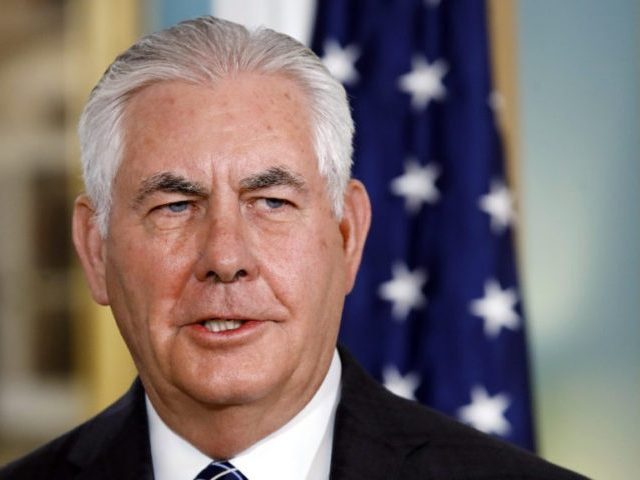“Iranian militias that are in Iraq, now that the fight against Daesh and ISIS is coming to a close, those militias need to go home. The foreign fighters in Iraq need to go home and allow the Iraqi people to regain control,” Secretary of State Rex Tillerson said on Sunday.
Tillerson spoke at a press conference with Saudi Foreign Minister Adel Jubeir in Riyadh, following what Reuters describes as a “rare joint meeting with the leaders of Iraq and Saudi Arabia.”
A senior U.S. official clarified to Reuters that Tillerson’s invitation to “go home” was specifically directed at the Shiite-dominated Popular Mobilization Forces (PMF) militia and Iran’s Quds Force, which has been providing material support, training, and operational leadership for them.
Tillerson added that the United States hopes “European companies, countries, and others around the world” will join in isolating Iran’s Islamic Revolutionary Guard Corps (IRGC), which oversees the Quds Force. He said the IRGC is working to “foment instability in the region and create destruction in the region.”
Tillerson’s comments came as somewhat of a surprise following his State Department’s declaration that they were “not aware of any Iranian involvement” in the Iraqi operations in question. The Iraqi government, PMF, and IRGC have launched an invasion of the Kurdistan Regional Government (KRG), beginning in the disputed territory of Kirkuk. Spokeswoman Heather Nauert said Thursday that the State Department considered the Kirkuk attacks a “coordinated” move between the Kurds and Baghdad.
Iran naturally responded by expressing anger at the involvement of their Saudi rivals in Iraq’s affairs.
“Exactly what country is it that Iraqis who rose up to defend their homes against ISIS [should] return to? Shameful U.S. foreign policy dictated by petrodollars,” railed Iranian Foreign Minister Mohammad Javad Zarif on Twitter, disingenuously portraying the PMF as a grass-roots home-grown counter-insurgency force.
The office of the Iraqi Prime Minister responded negatively to Tillerson’s call as well.
“The warriors of the Hashd al-Shaabi are patriotic Iraqis and paid with their lives in the defense of their country and the people of Iraq and they abide by the Iraqi command according to the law of the parliament. No one has the right to interfere in Iraqi affairs and decide what they should do,” said a statement from Haider al-Abadi’s office released on Monday.
Tillerson’s trip to Riyadh helped launch the Saudi Arabia-Iraq Coordination Committee, which brought Saudi King Salman and Iraqi Prime Minister Haider al-Abadi together this weekend. Saudi Arabia and Iraq have been estranged ever since the latter invaded Kuwait in 1990 under the leadership of former dictator Saddam Hussein.
Tillerson applauded the reopening of a major border crossing between Saudi Arabia and Iraq in August, along with the resumption of direct flights between Riyadh and Baghdad, as the beginning of “what we hope will be even more tangible actions to improve relations and strengthen cooperation on a host of issues.”
“Your growing relationship between the kingdom and Iraq is vital to bolstering our collective security and prosperity and we take great interest in it,” he told the Saudi and Iraqi delegations to the inaugural committee meeting.
Iraqi PM Abadi said his country is “open and we want to move away from the past.” He called for “interference in the internal affairs of other states” to stop.
The Associated Press describes a U.S. strategy to create a “new axis” of power in the Middle East that “unites Saudi Arabia and Iraq as a bulwark against Iran’s growing influence from the Persian Gulf to the Mediterranean Sea.” The Saudis see economic opportunities in Iraq, which will need partners for rebuilding cities like Mosul that were devastated by the Islamic State. They’re also making an ethnic appeal to Shiite-dominated Iraq by suggesting Arab states should unite against Iran, which is the dominant Shiite power but not an Arab nation.
From this strategic perspective, there is sense in the Trump administration’s apparent desire to resolve the Kurdish bid for independence quickly, removing the last justification for Iranian advisers to remain embedded with Iraqi Shiite militia groups. The alternative could be an Iraqi civil war that Iran would be heavily involved with, or a fragmented Iraq in which a smaller, weaker Baghdad government moves decisively into Tehran’s orbit.

COMMENTS
Please let us know if you're having issues with commenting.